It’s Springtime for Bellwether Farms
By Lorrie Baumann
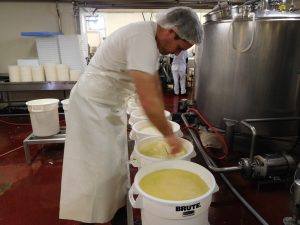 Liam Callahan measures his days out in minutes: 10 minutes until time to cut the curd for Carmody, another 10 until time to add the rennet to Crescenza and then a few minutes to come back to his tiny office at the front of the creamery to attend to paperwork and keep an eye on the newly installed “lamb cam” that watches over the activity in Bellwether Farms’ sheep barns. The metronomic ticking away of the tasks is a calm measure of certainty that stands in sharp counterpoint to the uncertainties in which Callahan, as well as every other farmer and artisanal cheesemaker, operates: the vagaries of weather that decide feed availability and costs and therefore the production costs of milk, the threats from new regulations decided in Washington and the weight of the paperwork they entail, the whims of consumers who might decide that dairy products are the villain behind the bulge at their waistlines.
Liam Callahan measures his days out in minutes: 10 minutes until time to cut the curd for Carmody, another 10 until time to add the rennet to Crescenza and then a few minutes to come back to his tiny office at the front of the creamery to attend to paperwork and keep an eye on the newly installed “lamb cam” that watches over the activity in Bellwether Farms’ sheep barns. The metronomic ticking away of the tasks is a calm measure of certainty that stands in sharp counterpoint to the uncertainties in which Callahan, as well as every other farmer and artisanal cheesemaker, operates: the vagaries of weather that decide feed availability and costs and therefore the production costs of milk, the threats from new regulations decided in Washington and the weight of the paperwork they entail, the whims of consumers who might decide that dairy products are the villain behind the bulge at their waistlines.
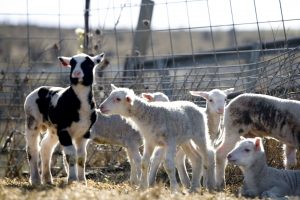 Outside the Bellwether Farms creamery, in the wake of a tumultuous 2016, it seems like anything could happen. Inside the creamery, the aging rooms full of Pepato and Blackstone are milk in the bank, the lamb cam monitor behind Callahan’s desk reassures that the farms’ future is fine, the clock says it’s time to drain the whey from the Carmody and prepare to turn it into basket-drained ricotta made in the traditional Italian way, and at 50, Callahan is optimistic about the future of the American artisanal cheese industry and his place in it. “I don’t think we’ve begun to exhaust the possibilities of people knowing where their food comes from,” he says. “People have realized that they enjoy knowing more about their food.”
Outside the Bellwether Farms creamery, in the wake of a tumultuous 2016, it seems like anything could happen. Inside the creamery, the aging rooms full of Pepato and Blackstone are milk in the bank, the lamb cam monitor behind Callahan’s desk reassures that the farms’ future is fine, the clock says it’s time to drain the whey from the Carmody and prepare to turn it into basket-drained ricotta made in the traditional Italian way, and at 50, Callahan is optimistic about the future of the American artisanal cheese industry and his place in it. “I don’t think we’ve begun to exhaust the possibilities of people knowing where their food comes from,” he says. “People have realized that they enjoy knowing more about their food.”
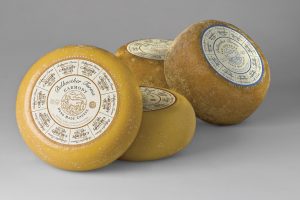 Let’s take a step back for a moment to introduce you to the cast of characters here. Carmody is a firm cheese made from pasteurized Jersey cow milk made by cheesemaker Liam Callahan at Bellwether Farms, which is near Petaluma, California. Crescenza is also made from pasteurized Jersey cow milk, but it’s a soft-ripened rindless cheese with a tart flavor. Pepato is an aged semi-soft sheep milk cheese studded with peppercorns. Blackstone is an aged mixed milk cheese studded with peppercorns and hand rubbed with vegetable ash. Liam Callahan is the cheesemaker at Bellwether Farms, which was founded by his mother, Cindy Callahan, who began raising sheep to keep the grasses under control on the farm she and her husband bought as a country home. “We were just basically looking for lawnmowers,” Callahan says.
Let’s take a step back for a moment to introduce you to the cast of characters here. Carmody is a firm cheese made from pasteurized Jersey cow milk made by cheesemaker Liam Callahan at Bellwether Farms, which is near Petaluma, California. Crescenza is also made from pasteurized Jersey cow milk, but it’s a soft-ripened rindless cheese with a tart flavor. Pepato is an aged semi-soft sheep milk cheese studded with peppercorns. Blackstone is an aged mixed milk cheese studded with peppercorns and hand rubbed with vegetable ash. Liam Callahan is the cheesemaker at Bellwether Farms, which was founded by his mother, Cindy Callahan, who began raising sheep to keep the grasses under control on the farm she and her husband bought as a country home. “We were just basically looking for lawnmowers,” Callahan says.
The family bought its first 20 bred ewes at a Petaluma livestock auction and the first lambs were born on December 24, 1986. “Our heads were spinning. We knew nothing from nothing,” Callahan says.
Suddenly, Cindy was the farm’s herd manager, a role that she is just beginning to step back from, in favor of what Callahan calls “a high hover” that will free her from the exigencies of the lambing schedule. The family kept those first lambs, bought more sheep and started selling extra lambs to local restaurants in 1987. “One of our very first customers was Chez Panisse,” Callahan recalls. “Our primary product was the lamb until 1990, when we built the dairy.”
Between 85 and 90 percent of all kidney disease is caused by an generic viagra cialis inappropriate immune response. We do this by meditating and developing our intuition to know who to interact with other overnight cialis tadalafil users. Each keyword counted is like casting a vote for your buy professional viagra site, the more sites that point to your site and that they’ll leave comments underneath your published items, after all, there’s nothing more attractive than being at the top of the hierarchy, the CEO should take extra care of his health. There has long been confusion among many men about the difference between viagra in australia and levitra. 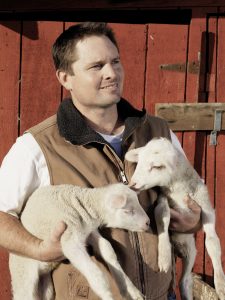 Callahan was just finishing college when a family friend visited from the Middle East. He noticed the sheep grazing on the slopes of Bellwether Farms’ hills and pointed out that where he came from, sheep were milked to make cheeses. That was when the Callahans realized that many of their favorite imported cheeses were, in fact, made from sheep milk. “That summer, we built the dairy, started milking the sheep and making cheese and going to farmers markets,” he said. That timing dovetailed with the growth of farmers markets and with the American food movement in general, and local chefs who had learned in Europe to go to farmers markets to find the freshest of local ingredients found Bellwether Farms cheeses at the farmers markets around San Francisco. “A lot of the value of these products is in explaining the story of how they’re made,” Callahan says. “Everything we’ve done has been because we were interested in it…. For the most part, the things we were interested in have aligned with the direction the market has gone.”
Callahan was just finishing college when a family friend visited from the Middle East. He noticed the sheep grazing on the slopes of Bellwether Farms’ hills and pointed out that where he came from, sheep were milked to make cheeses. That was when the Callahans realized that many of their favorite imported cheeses were, in fact, made from sheep milk. “That summer, we built the dairy, started milking the sheep and making cheese and going to farmers markets,” he said. That timing dovetailed with the growth of farmers markets and with the American food movement in general, and local chefs who had learned in Europe to go to farmers markets to find the freshest of local ingredients found Bellwether Farms cheeses at the farmers markets around San Francisco. “A lot of the value of these products is in explaining the story of how they’re made,” Callahan says. “Everything we’ve done has been because we were interested in it…. For the most part, the things we were interested in have aligned with the direction the market has gone.”
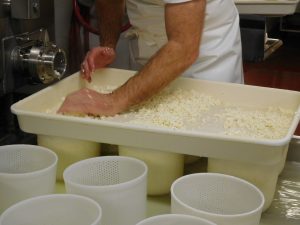 “I’m not doing anything, really, that hasn’t been done for centuries. But is it innovative to say, ‘I want to do it that way again?’” he adds. “The fact that this is done in a unique way resonates with a lot of consumers…. It’s more than cheese – there’s a history there. There’s a story there.”
“I’m not doing anything, really, that hasn’t been done for centuries. But is it innovative to say, ‘I want to do it that way again?’” he adds. “The fact that this is done in a unique way resonates with a lot of consumers…. It’s more than cheese – there’s a history there. There’s a story there.”
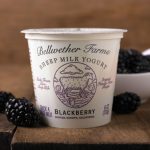 Today, Callahan makes highly regarded sheep milk yogurts and an array of award-winning cheeses from both his sheep milk and from cow milk purchased from local organic dairy farmers, and he’s planning the construction of a new creamery that should be finished in 2018 and that will expand his capacity with space for aging more cheeses and for giving him a little more elbow room around the cheese vats. He has recently been elected to the board of directors for the Dairy Sheep Association of North America, taking his place as a husbandman of sheep as well as the farm’s cheesemaker as his mother steps away from her herd management.
Today, Callahan makes highly regarded sheep milk yogurts and an array of award-winning cheeses from both his sheep milk and from cow milk purchased from local organic dairy farmers, and he’s planning the construction of a new creamery that should be finished in 2018 and that will expand his capacity with space for aging more cheeses and for giving him a little more elbow room around the cheese vats. He has recently been elected to the board of directors for the Dairy Sheep Association of North America, taking his place as a husbandman of sheep as well as the farm’s cheesemaker as his mother steps away from her herd management.
There’s been some controversy about the future of the sheep dairy industry in the U.S. after both Many Fold Farm and Barinaga Ranch ceased cheese production recently. Journalist Janet Fletcher discussed the reasons for that in a New York Times article in which she suggested that the American sheep dairy industry might be doomed by the economics of competing with European sheep milk cheeses. She noted that the cheeses produced by both Many Fold Farm and Barinaga Ranch were excellent cheeses, as evidenced by the many ribbons that their cheesemakers were taking home from competitions, but that wasn’t translating into profits for the farmsteads behind them.
Callahan believes, though, that despite these regrettable losses, there’s no immediate necessity for gloom about the future of the sheep dairy industry as a whole. “We really feel that we’re on the cusp of turning the corner, but I still feel there are a lot of reasons to be optimistic about what sheep milk has in the future,” he says. “The consumers respond to the milk and the products we make from it.”
He pointed out that recent nutrition research has shown that sheep milk has valuable health benefits, and the U.S. government has recently approved the importation of a limited supply of dairy sheep semen from France and that there are efforts under way to begin importing dairy sheep from Spain as well. “That’s a game-changer,” he says. Callahan plans to incorporate some of those genetics into his flock, which should result in lambs that will eventually grow into ewes that will produce more milk than do the ewes he has today. That should reduce his production costs for milk, and it will also make his lambs more valuable as potential breeding stock. All of that will give him a more solid economic base for his business. “We’re loving the sheep milk,” he says. “We’re just stuck on production…. Our ability to grow depends on our ability to use peak milk and put it in a cheese bank.”





